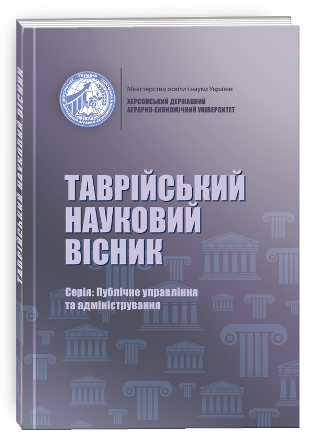THE CONSEQUENCES OF THE INFLUENCE OF THE STRUCTURAL FACTOR TRINITY ON THE DEVELOPMENT OF CIVIL SOCIETY
DOI:
https://doi.org/10.32782/tnv-pub.2023.5.5Keywords:
state policy, state administration, state power, civil society, democratic transformationAbstract
The article considers the consequences of the impact of the structural factor trinity on the development of civil society. It is noted that the events of the last dozen years, starting with the independence of Ukraine, gradually influenced the formation of a full-fledged democratic civil society, whose members are fully capable of forming and defending their civil position. Along with this, the work revealed a structural factor trinity that affects the development of civil society, it consists of historical, state, and individual factors. Thus, the influence of the historical factor leads to the formation of the foundations of civil society and forms the ability of its emergence in the state. The fundamental nature of the influence of the first factor, which influences the formation of the political organization of society, has been proved. The process of building a civil society in a democratic state is attributed to the influence of the second factor. The stated opinion is about the anticipatory nature of civil society, in which it is not the state through the institutions of power that influences civil society, but on the contrary – the development of the political organization of society forms a new vision of the state. Which leads to manifestations of the third factor, under the influence of which the formation of one’s own “I”, of each member of civil society, takes place. This opinion is expressed through the clarification of the nature of meeting the needs of members of society in the protection of their civic position, based on theoretical studies of existing theories of motivation. The work concludes about the mandatory interaction of the state and society, the result of which is the existence of a person in a democratic, socially oriented environment, where the rights and freedoms of all members of society are fulfilled.
References
Формування та становлення громадянського суспільства в Україні: монографія. авт.кол.: В.І. Цимбалюк, В.І. Гришко, І.В. Міщук та ін. Одеса: КУПРІЄНКО СВ, 2019. 158 с.
Герасименко Д. Ідея громадянського суспільства (І. Кант та Е. Левінас): дис. на здобуття наук. ступеня канд. філософс. наук. 09.00.05 – історія філософії. Київ, 2017. URL: http://www.npu.edu.ua/images/file/vidil_aspirant/dicer/K_26.053.13/dis_Gerasimenko.pdf. 2
Гегель Г. Основи філософії права. К., 2000р. 346 с.
Бичков М.М. Фактори виникнення і розвитку громадянського суспільства. Науковий журнал «Політкурс». 2017. Випуск 3. С. 5–10.
Maslow, A. H. Motivation and Personality. New York: Harpaer & Row, 1954. 411 р.
Alderfer, Clayton P. An empirical test of a new theory of human needs. Organizational Behavior and Human Performance . 1969. Vol. 4 (2). Р. 142–175.
Роль і місія громадянського суспільства. Чи потрібні людям «посередники»? URL: https://www.ukrinform.ua/rubric-society/2834247-rol-i-misia-gromadanskogosuspilstva-ci-potribni-ludam-poseredniki.html







